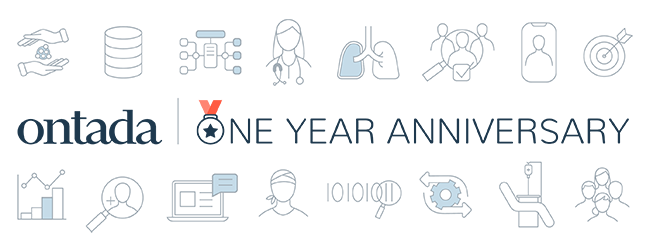Read time: 4.5 minutes
When McKesson launched Ontada last year, the company had one goal in mind: to transform the fight against cancer by leveraging the power of technology, clinical education, data and research. While the mission is ambitious, this new business was built upon McKesson’s legacy of creating value in community oncology care, generating real-world data insights, and ultimately driving better patient outcomes.
In the first year alone, Ontada has already made great strides alongside its partners in advancing its mission. It signed strategic agreements with two life sciences industry leaders to improve cancer care. It participated in over 30 research publications and co-launched an ambitious real-world research consortium to advance precision medicine for lung cancer. And, most recently, it unveiled a new initiative, the HOPE™ Studies, aimed at leveraging real-world data (RWD) to address healthcare disparities.
Read on to learn how these achievements are making an impact in the industry today.
Two strategic agreements to improve outcomes
In the current oncology landscape, access to cutting-edge innovations in cancer care is largely dependent on patient demographics, socioeconomic status, and care settings. Additionally, the vast majority of new cancer patients are first seen in community settings. That’s why one of Ontada’s earliest initiatives was aimed at advancing cancer innovation right in the communities where patients live.
Late last year, Ontada and biotechnology leader Amgen signed a multi-year strategic agreement to transform cancer care and improve patient outcomes by accelerating the development of and access to life-changing cancer therapies. Through this collaboration, Ontada and Amgen are launching various programs, including:
- Elevating awareness of molecular testing to optimize care in patients that benefit from targeted therapy,
- Uncovering insights on unmet needs and treatment outcomes by enriching data and insight capabilities, and
- Optimizing therapy sequencing to improve patient outcomes, including supportive care.
In August, Ontada signed another strategic agreement with life sciences company Merck to improve the quality of patient care. Through this agreement, the two companies are harnessing RWD and evidence-based insights at the point of care, allowing them to accelerate innovation and improve cancer therapies.
In addition to these strategic long-term partnerships, in its first year Ontada worked with over 100 oncology life sciences companies of all sizes, from large multinational pharmaceutical companies to single-therapy biotechnology companies, to advance their clinical and commercial strategies.

Early MYLUNG ConsortiumTM Breakthroughs
According to the American Cancer Society, non-small cell lung cancer (NSCLC) is the most common type of lung cancer, accounting for roughly 85% of all lung cancer cases diagnosed today. Earlier this year, Ontada helped launch the MYLUNG Consortium with The US Oncology Network (The Network), US Oncology Research, life sciences companies and patient advocacy groups. MYLUNG brings together a diverse set of organizations and stakeholders working across the spectrum of NSCLC therapy, drug development and care to improve the lives of patients. A unique, collaborative real-world research consortium, MYLUNG will study up to 12,000 NSCLC patients in the community setting over five years.
This summer, Ontada, as well as The Network and US Oncology Research released early results from Protocol 1 of the MYLUNG Consortium research study. Their findings were unveiled during the 2021 American Society of Clinical Oncology (ASCO) Annual Meeting in June. Protocol 1 serves as a baseline to understand what has been happening with patients in the community practice setting. The data revealed just 55% of patients complete a full set of comprehensive testing. Ultimately, this information can help to transform when and how testing is administered – a critical first step in ensuring patients receive targeted, evidence-driven care.
Protocol 2, which is currently being conducted through US Oncology Research, is monitoring the real-world patient journey from presentation through their first line of cancer therapy, focusing on how diagnostic biomarker information is obtained, utilized, and operationalized in decision-making.
Powering evidence-driven cancer care at the point of need
Ontada made continued strides in advancing its suite of technology solutions, which help enable community oncology clinicians to provide the best patient care and manage their practices, including the oncology-specific iKnowMedSM electronic health record.
During its first year, Ontada:
- Launched a new mobile experience for iKnowMed, giving providers even more flexibility in managing patient records, while enabling oncologists to operate more efficiently.
- Provided its 950,000th set of evidence-based treatment options through Clear Value Plus, a regimen support tool used by oncology providers to deliver quality cancer care.
- For the fifth consecutive year, Ontada’s Practice Insights tool received approval from The Centers for Medicare & Medicaid Services (CMS) to participate in the Merit-based Incentive Payment System (MIPS) as a Qualified Clinical Data Registry (QCDR).
- Ontada’s various targeted channels have enabled over 400,000 annual educational exchanges via 15-plus digital and in-person platforms, enabling thousands of oncology providers to remain at the forefront of patient care.
Addressing healthcare disparities
Despite decades of innovative breakthroughs in cancer care, disparities in cancer care still exist. That’s why Ontada launched Health Outcomes Powered by Evidence (HOPE) Studies, a research program that enables eligible providers in The Network to investigate unanswered questions about health disparities in cancer care through retrospective, non-interventional studies. With HOPE Studies, eligible providers may propose research ideas and, for selected proposals, receive dedicated Ontada resources to operationalize, conduct, and publish the research.
Looking ahead
Ontada has made significant strides in its first year and looking ahead, the business will continue to build on this momentum by leveraging the power of McKesson’s oncology ecosystem, including its collaborators in The Network, US Oncology Research and McKesson Provider Solutions, as well as the strength of its relationships with life sciences and provider partners to transform the fight against cancer.




Share
Post
Post
Email